
Intellectual and Developmental Disabilities
Scope & Guideline
Advancing knowledge for a brighter future.
Introduction
Aims and Scopes
- Research on Inclusive Practices:
The journal prioritizes studies that explore inclusive practices in education, healthcare, and community settings, emphasizing the importance of participation and integration for individuals with IDD. - Interdisciplinary Approaches to IDD:
The journal encourages interdisciplinary research that draws insights from various fields such as psychology, social work, education, and public health to address the complex needs of individuals with IDD. - Community and Family Engagement:
Research that examines the roles of families and communities in supporting individuals with IDD is a core focus, with an emphasis on resilience, support systems, and advocacy. - Policy and Systemic Changes:
The journal discusses the implications of policy and systemic changes on the lives of individuals with IDD, advocating for equity, access, and social inclusion. - Direct Support Workforce Issues:
A significant area of focus is on the challenges and experiences of direct support professionals, including issues related to training, retention, and the impact of the workforce on service quality.
Trending and Emerging
- Mental Health and Wellness:
There is an increasing focus on the mental health and emotional well-being of individuals with IDD, with research exploring interventions and support systems that promote psychological resilience. - Intersectionality and Equity:
Emerging studies are examining the intersectionality of identity factors (such as race, gender, and socioeconomic status) and their impact on the experiences of individuals with IDD, highlighting the need for equitable practices. - Technology and Digital Health Solutions:
Innovative uses of technology, including mobile health applications and telehealth services, are gaining attention as tools to improve access to care and support for individuals with IDD. - Community-Based Services and Supports:
Research focusing on the effectiveness of community-based services, including home- and community-based services (HCBS), is increasingly prominent, emphasizing the importance of localized support. - Youth and Transition Services:
There is a growing emphasis on the experiences of youth with IDD during transition periods, particularly related to education, employment, and community integration, reflecting a commitment to support through critical life stages.
Declining or Waning
- Traditional Disability Models:
Research that adheres strictly to traditional medical or deficit-oriented models of disability is becoming less prevalent, as the field increasingly embraces social and rights-based models. - Generalized Educational Strategies:
There is a noticeable decline in publications focusing solely on generalized educational strategies without consideration of individualization or inclusive practices tailored for students with IDD. - Sheltered Employment Models:
As the movement toward integrated and competitive employment gains momentum, research focused on sheltered employment models and their efficacy is diminishing. - Single-Dimensional Health Studies:
Studies that examine health issues in isolation without considering the broader context of social determinants and health equity are becoming less common, reflecting a shift towards more comprehensive approaches. - Historical Perspectives on IDD:
Research that primarily reviews historical perspectives or past practices without linking to current implications or future directions is losing traction in favor of forward-looking studies.
Similar Journals

Education and Training in Autism and Developmental Disabilities
Championing Progress in Autism and Developmental EducationEducation and Training in Autism and Developmental Disabilities is a prominent journal published by the Council for Exceptional Children, focusing on innovative research and insights in the field of autism and developmental disabilities education. With an evolving scope since its inception, the journal emphasizes the importance of evidence-based practices, pedagogical strategies, and interdisciplinary approaches to enhance educational outcomes for individuals with autism and related conditions. Although it currently holds a Q3 category in Developmental and Educational Psychology and is ranked in the Q2 category in Education, it continues to gain recognition with a respectable placement in Scopus rankings—indicating that it plays a crucial role in informing educational practices and policy decisions. Researchers and practitioners can access a wealth of information through its open access options, underscoring a commitment to disseminating knowledge widely. By bridging the gap between research and real-world application, this journal serves as an essential resource for education professionals seeking to advance their understanding and improve the quality of education for neurodiverse learners.
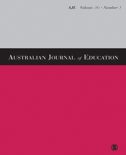
AUSTRALIAN JOURNAL OF EDUCATION
Shaping the Future of Education with Insightful AnalysisThe Australian Journal of Education, published by SAGE Publications Ltd, is a renowned platform dedicated to advancing scholarly discourse in the field of education. With an ISSN of 0004-9441 and an E-ISSN of 2050-5884, this journal is widely recognized for its rigorous peer-reviewed articles that contribute to theoretical and practical advancements in educational research. As of 2023, it holds a commendable Q2 quartile ranking in the field of Education, reflecting its significant impact within the academic community, with a Scopus rank of #491 out of 1543 in the Social Sciences - Education category, placing it in the 68th percentile. The journal seeks to explore diverse educational issues ranging from policy analysis to pedagogical innovations, making it an invaluable resource for researchers, professionals, and students alike who are committed to enhancing educational practices and outcomes. With issues published regularly from 1992 to 2024, the Australian Journal of Education remains a cornerstone for those engaged in critical discussions surrounding educational theory and applications.
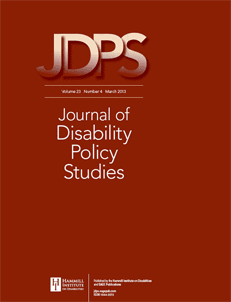
Journal of Disability Policy Studies
Shaping policies for a more equitable society.The Journal of Disability Policy Studies, published by SAGE Publications Inc, stands as a pivotal scholarly resource in the field of disability studies, intersecting the domains of health and law. Established in 1990, this peer-reviewed journal has cultivated a rich legacy of disseminating high-quality research, evidenced by its impressive rankings within the Q2 and Q1 quartiles respectively in Health (Social Science) and Law as of 2023. With a significant impact factor reflected in its Scopus rankings, positioning it in the 88th percentile in Law and the 60th percentile in Health, the journal serves as an essential platform for scholars and practitioners dedicated to advancing the nuanced understanding of policy issues affecting individuals with disabilities. The journal not only stimulates academic discourse but also provides valuable insights aimed at informing policy development and implementation, making it an indispensable resource for researchers, professionals, and students alike.
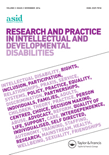
Research and Practice in Intellectual and Developmental Disabilities
Fostering collaboration for meaningful change in disabilities.Research and Practice in Intellectual and Developmental Disabilities is an esteemed journal published by Routledge Journals, Taylor & Francis Ltd, dedicated to advancing knowledge and practices in the fields of intellectual and developmental disabilities. Since its inception in 2014, this journal has played a pivotal role in disseminating high-quality research and innovative practices through a rigorous peer-review process, aimed at enhancing the lives of individuals with disabilities. With an ISSN of 2329-7018 and an E-ISSN of 2329-7026, this journal focuses on a spectrum of interdisciplinary approaches, including the latest in developmental neuroscience and clinical neurology. Despite its Q4 and Q3 rankings in related categories such as Developmental Neuroscience and Neurology, respectively, it continues to attract contributions from a diverse array of scholars, providing vital insights and evidence-based practices. While remaining firmly committed to academic integrity and quality, the journal serves as a critical platform for researchers, professionals, and students alike, who are keen to address contemporary challenges and foster effective interventions within the realm of intellectual and developmental disabilities.

Ankara Universitesi Egitim Bilimleri Fakultesi Ozel Egitim Dergisi-Ankara University Faculty of Educational Sciences Journal of Special Education
Advancing inclusive education through research.Ankara Universitesi Egitim Bilimleri Fakultesi Ozel Egitim Dergisi (Ankara University Faculty of Educational Sciences Journal of Special Education) is a premier, peer-reviewed journal dedicated to the dissemination of high-quality research in the field of special education. Published by ANKARA UNIV, FAC EDUCATIONAL SCIENCES and made available as an Open Access publication since 2015, this journal caters to a global audience of researchers, educators, and practitioners committed to advancing the knowledge and practices in special education. With an ISSN of 1304-7639 and an E-ISSN of 2149-8261, the journal aims to foster impactful discussions and collaborations in educational sciences, focusing on innovative methodologies, inclusive practices, and effective interventions. Its commitment to open access ensures that vital research is accessible to all, thus enhancing the educational landscape. By prioritizing rigorous scholarly contributions, the journal plays a key role in shaping the future of special education in Turkey and beyond.
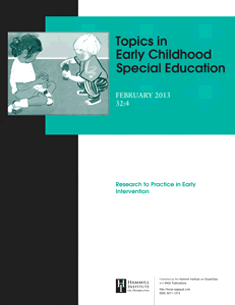
TOPICS IN EARLY CHILDHOOD SPECIAL EDUCATION
Advancing Knowledge in Early Childhood Special EducationTOPICS IN EARLY CHILDHOOD SPECIAL EDUCATION is a premier journal published by SAGE PUBLICATIONS INC, dedicated to advancing the field of early childhood education for children with special needs. This journal, with its ISSN 0271-1214 and E-ISSN 1538-4845, has been a significant resource since its inception in 1981, bridging critical research in education and public health through rigorous peer-reviewed articles. Recognized for its excellence, it boasts a 2023 categorization in the Q1 quartile in both Education and Public Health, as well as impressive Scopus rankings that position it among the top journals in its fields. The journal aims to provide a platform for innovative practices, policy development, and empirical research, fostering collaboration among educators, practitioners, and scholars. It is essential for those engaged in shaping effective interventions and systems for young learners, making it a must-read for professionals and academics seeking to enhance their understanding and impact in early childhood special education.

Learning Disabilities-A Multidisciplinary Journal
Connecting research and practice for impactful change.Learning Disabilities-A Multidisciplinary Journal is a leading academic journal published by SAGAMORE PUBLISHING LLC, dedicated to advancing the understanding of learning disabilities through a multidisciplinary approach. With a focus on research that incorporates psychological, educational, and social perspectives, this journal serves as a vital resource for researchers, educators, clinicians, and practitioners committed to improving the lives of individuals with learning disabilities. The journal aims to foster scholarly dialogue and disseminate innovative findings, thereby enhancing existing knowledge and informing best practices. Although it currently does not offer open access options, it provides robust insights and rigorous research, ideally positioned to influence the field. By adhering to high academic standards and expanding its reach, Learning Disabilities contributes significantly to evidence-based practices and interventions, making it an essential platform for academic and professional discourse in the study of learning disabilities.
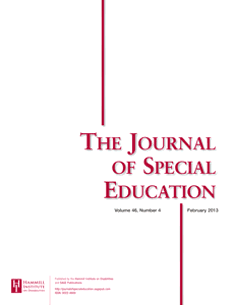
JOURNAL OF SPECIAL EDUCATION
Exploring diverse learning needs and methodologies.The JOURNAL OF SPECIAL EDUCATION, published by SAGE PUBLICATIONS INC, is a leading academic journal in the fields of education and rehabilitation, dedicated to advancing knowledge and research practices for individuals with disabilities. Established in 1966 and converging into a rich legacy of scholarship, the journal is esteemed for its rigorous peer-reviewed articles, boasting a top-tier Q1 ranking in both the Education and Rehabilitation categories. With a commendable impact, it ranks #36 out of 161 in Medicine Rehabilitation and #349 out of 1543 in Social Sciences Education, placing it in the 77th percentile in both contexts. The journal serves as a vital platform for educators, researchers, and practitioners to disseminate innovative studies and methodologies that profoundly influence special education practices. While not open access, its contributions are pivotal for advancing inclusive educational strategies and fostering greater understanding of diverse learning needs. For those engaged in special education research, the JOURNAL OF SPECIAL EDUCATION is an essential resource for current trends, theories, and practices shaping the future of the field.
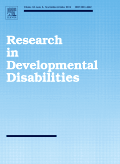
Research in Developmental Disabilities
Empowering insights for impactful interventions.Research in Developmental Disabilities is a leading journal published by PERGAMON-ELSEVIER SCIENCE LTD, dedicated to advancing the field of developmental disabilities through rigorous research and evidence-based insights. Since its inception in 1987 and continuing through 2024, the journal has made significant contributions to the understanding of developmental and educational psychology, earning a commendable impact factor and ranking in the Q2 quartile in both Clinical Psychology and Developmental and Educational Psychology categories for 2023. The journal, with ISSN 0891-4222 and E-ISSN 1873-3379, features original research articles, reviews, and practical applications aimed at professionals, researchers, and students in the field, fostering a multidisciplinary dialogue around theories, interventions, and policies that shape the lives of individuals with developmental disabilities. While currently not an open access journal, it offers a crucial platform for disseminating knowledge and sparking innovative approaches to enhance educational and psychological outcomes for affected populations. With its roots in the United States and a global influence, Research in Developmental Disabilities is vital for those committed to understanding and improving the developmental trajectories of individuals facing these unique challenges.

ADAPTED PHYSICAL ACTIVITY QUARTERLY
Exploring New Frontiers in Rehabilitation.ADAPTED PHYSICAL ACTIVITY QUARTERLY is a leading peer-reviewed journal published by Human Kinetics, dedicated to the exploration of innovative approaches in adapted physical activity. Established in 1988, this esteemed journal serves as a crucial platform for researchers, practitioners, and students in the fields of Physical Therapy, Sports Therapy, and Rehabilitation, boasting a commendable Impact Factor and a solid reputation reflected in its Q2 quartile ranking in Physical Therapy and Rehabilitation, as well as Q3 in Sports Science according to the latest metrics. With a clear focus on enhancing the quality of life through physical activity, ADAPTED PHYSICAL ACTIVITY QUARTERLY encourages groundbreaking research and discussion on the development of adapted physical practices. Researchers in related disciplines will find a wealth of insightful studies, timely discussions, and practical applications aimed at promoting inclusive fitness and rehabilitation. As a non-open access journal, ADAPTED PHYSICAL ACTIVITY QUARTERLY is essential for those committed to advancing the understanding and implementation of adapted physical activities across diverse populations.